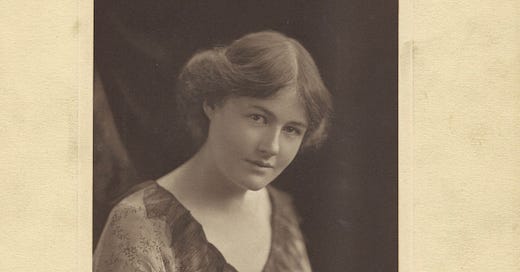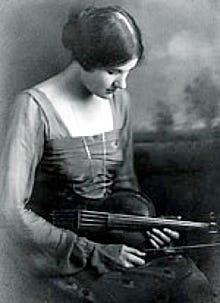Look up the composer and violist Rebecca Clarke on Wikipedia and you’re presented with one of the best-known images of her, taken in 1919. She’s sitting holding her viola, face turned down away from the camera; she seems absorbed by the instrument and the music she might make with it, lost in a reverie, moving her fingers along the fingerboard. Her hair is loosely tied back in a bun, and with the hazy background and sheer-sleeved dress it gives her an almost Pre-Raphaelite look. She looks modest, unassuming, passive.
The impression given by this picture is reflected in many biographical sketches of Clarke. She composed over a hundred works, including a Viola Sonata, Piano Trio, and Rhapsody for Cello and Piano, but it’s often said that she ‘felt society’s pressure to conform to a more traditional female role’. Navigating such a male-dominated environment as early twentieth-century music left her with a ‘fragility of her own belief in her creative powers’ and a ‘conflicted identity’ as a composer, with a ‘readiness to minimise her own achievement.’ Looming large over this interpretation is Rebecca’s relationship with her abusive father, Joseph Clarke, who beat all his children. Rebecca described in her memoir how ‘we were all of us whipped, sometimes really painfully’, and Rebecca’s experiences with an aggressive father have been offered as a reason why she internalised ‘widely held views of the limitations of women’s roles and capabilities, rather than battling against them.’
But just how true is this version of Clarke’s personality? Did she accept the idea that women shouldn’t and couldn’t compose? And did she ‘hesitate at any form of going against the grain’? The diary she kept throughout the 1920s doesn’t seem to suggest so. When she completed her most famous work, the Viola Sonata, in July 1919, she said she had ‘Expected to hate it after all that work’, but after hearing a performance she was ‘really […] rather pleased with it.’ Three years later she was ‘Very thrilled’ to see the Sonata in print. When her Piano Trio was performed in January 1922 she wrote that she was 'So excited with the Trio I could hardly sleep’. This hardly seems like a woman conflicted about her identity as a composer.
If anything, she often expressed confidence in her own compositions. When Ethel Cole and Gladys Green played her song ‘Eight O’Clock’, Clarke wrote that ‘they liked it awfully. So did I!!’ Similarly when she revised another song, ‘The Seal Man’, it was not because she thought it inadequate or felt insecure about her work, but because 'I feel it is so good and I want it to be better & simpler.’ And she was clearly unafraid to have critics judge her work. When she gave a performance of the Viola Sonata in New York she wrote to Richard Aldrich, then the chief critic of the New York Times, to invite him personally to her recital, telling him she ‘had so much wanted you to hear me play my Viola Sonata’.
Yes, Clarke expressed moments of doubt and hesitation about her work. But which composer doesn’t? We could compare her diary to that of Jean Sibelius, who was often ‘dejected’ about responses to his music, reminding himself to ‘work away this feeling of insecurity’. Sibelius expressed far more hesitation about his compositions than Clarke, but that doesn’t make him “conflicted” about his identity as a composer — more like self-reflective. Of course gender would have inflected Sibelius and Clarke’s experiences differently, but occasional self-doubt is common to most composers, not just women.
And Clarke certainly stepped outside the norm a remarkable number of times for a woman afraid of ‘going against the grain’. In 1913 she made history by becoming one of the first six women hired by a professional orchestra in the UK, the Queen’s Hall Orchestra, already quite a statement. And in the photograph taken of the women, Clarke donned a large white lace collar, a look ‘that was considered a little bit daring’. She went on to tour internationally as a chamber performer, travelling to America, France, Holland, Singapore, Japan, China, India, Malaysia and Indonesia. And she was innovative in her programming — Clarke often played what were then extremely modern composers, from Ravel and Schoenberg to Bloch and Vaughan Williams, and frequently put her own music alongside them. If that wasn’t enough, she was also a member of several all-woman ensembles, starting up her own, the English Ensemble, in 1927.
As for her relationship with her father, the impact of his behaviour as a formative force in Clarke’s upbringing should not be overlooked. He could be cruel and physically abusive, to say nothing of his controlling behaviour, alternating violent episodes with moments of tenderness towards his children and wife. However, Clarke’s response to this — at least as she tells it in her memoir — was not to accept Joseph’s rulings and punishments. Quite the opposite, in fact. If anything, she showed far more defiance than compliance, and she saw her acts of rebellion against Joseph’s controlling behaviour as a way of establishing her own identity independent of her family unit.
In one instance, she recounts how her father sent her away from home for a period of time, the idea being that ‘by being sent away for a time I would learn to appreciate what a good home I had.’ This happened on two occasions — on the first, when she was sixteen, she was sent to Paris to stay with friends, and on the second she was simply banished from the family home. For somebody who had never had to survive by herself before, this could have been quite a terrifying experience. But Clarke seems to have approached the situation with calm. She rented a room for a week in Alexandra Place, and her verdict on the experience was that:
This was the first time I had ever been completely on my own, answerable to no one. It was a heady experience and, as in Paris, I soon found out what Papa had intended as a punishment turned out to be rather the reverse. For one thing, it saved a lot of time: the Royal College could be reached without all that tedious to and fro on the Metropolitan Railway; my London friends were more accessible; and it was fun to pick up my meals in stray restaurants and teashops.
While this account was written many years after the incident in question, the fact remains that Clarke’s response was not to go back to her father asking for forgiveness and reacceptance, but to rent a room and manage perfectly well on her own. Whether or not she might have felt more scared or conflicted at the time than her memoir lets on, the overall lesson that Clarke appears to have taken from this experience was that she could live independently — and that this had the potential to be a liberating existence.
We also need to remember that Joseph wasn’t the only family member with whom Clarke had a significant relationship. Clarke was very close to her mother Agnes throughout her life, and continued to live with her until Agnes died. It was Agnes who accompanied Clarke to her audition for the Royal Academy when she was sixteen, who regularly took her on trips to London, and who took all the children on seaside holidays without Joseph. As Rebecca put it, Agnes provided them with ‘companionable, peaceful times, islands of quiet in our usually turbulent household.’ Clarke associated Agnes with happiness and safety. Even when Joseph was at his most aggressive, Clarke felt that the family house ‘was still home, [because] Mama was there.’ Agnes’s presence as a counterbalancing force against Joseph’s violence complicates the narrative of Clarke’s childhood being entirely dominated by her father.
Certainly, the obstacles that Clarke faced as a woman musician were multiple and substantial, and should not be understated. But it matters, I think, that she found creative ways around them, and did not accept all the societal limitations imposed on her. Because framing women’s lives as a litany of insurmountable limitations and struggles will continue to marginalise them within music histories, leaving us with a partial and one-sided view of how musical society functioned in the early twentieth century. Clarke had agency, and although she was often working around constraints that were placed on women of the time, within these constraints she sought out education and professional training, pursued a career that allowed her to live independently of her family, created opportunities for work when she found certain doors closed to her, and in doing so became an important musical figure of the early twentieth-century.
This is crucial because Clarke was not the only woman making a musical career in these circumstances. Clarke’s closest circle of friends and colleagues was filled with professional women — her English Ensemble fellows were the cellist May Mukle, pianist Kathleen Long, and violinist Marjorie Hayward. All of them were internationally recognised concert artists, but shockingly little is known about them today (and they’ll all be subjects of future posts). The sheer number of extremely successful women who surrounded Clarke nuances the idea that she existed solely within a man’s world. In many important ways, Clarke shaped her world to be a woman’s world. She was both a contributor to, and beneficiary of, women’s networks that enabled other women to succeed. These women’s lives were full of contradictions, and we need both the difficulties they faced and how they negotiated them to understand the full complexity of their positions.
So perhaps we could choose another image of Clarke to go alongside the first, taken a few years before. There’s still an element of whimsical romanticism about it — her hair remains loosely coiffured and her dress is delicately patterned, fading into a soft focus on the right. But she looks up at the camera, directly, with the smallest hint of a smile. This is a picture that shows Clarke’s more assertive, playful, and determined side. This is the Clarke I hear in her glorious music, unafraid and unashamed of who she is.





Brilliant perspective - its so clear that most successful women in music (and indeed science) whose work & lives I've learnt about seem to have been largely very much celebrated and accepted in their day (with obvious limitations of course) - and it is history, not their contemporaries, which has written them out. I grew up thinking that women composers didn't exist and that what we see now is a new thing, many women composers getting into the spotlight (admittedly not as much as they should) - but its just not the case - they have always been there, - we seem to find it so easy to forget!